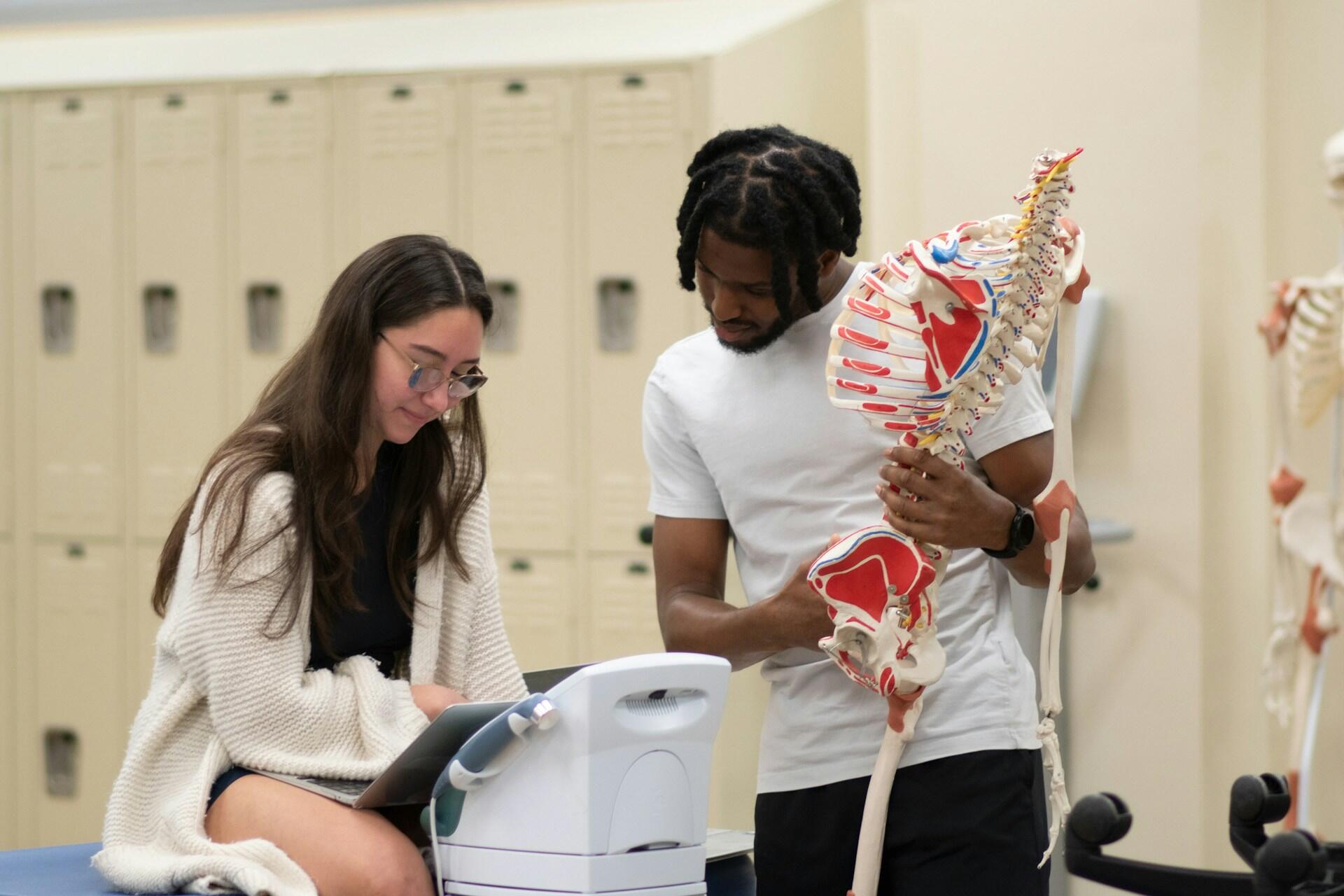Nurse educators, as the name suggests, are nurses who teach the next generation of nurses. They combine clinical expertise with quality teaching, preparing students for the realities of patient care while ensuring they also understand the underlying theory. Here, we'll explore the steps to becoming a nurse educator.

Step 1: Obtain a Registered Nurse (RN) License
The very first step to almost any nursing job is to qualify and work as a Registered Nurse (RN). Becoming a nurse educator is no exception. Before you can teach others, you have to know what you're teaching after all. Nurse educators need a deep understanding of how healthcare systems operate, which begins with completing a state-approved nursing education program and earning your RN license.
Becoming a nurse educator enables you to transform your clinical expertise into a meaningful impact. You'll guide future nurses, contribute to academic research, and help raise the standard of patient care nationwide. It's a career that blends leadership, teaching, and lifelong learning, with growing demand in both universities and hospitals across the U.S.
There are a few ways to become an RN. Generally, aspiring nurses either start with an Associate Degree in Nursing (ADN) or a Bachelor of Science in Nursing (BSN). The ADN, at two years, is shorter than the BSN, which is a four-year program offered at a university.

The BSN includes coursework in leadership, research, and public health, and many hospitals and academic institutions tend to prefer it over the ADN. That's because it prepares nurses for advanced roles and graduate-level education. However, you should be aware that there are bridging courses that can be completed after earning an ADN.
Once you've completed your degree, you have to complete the NCLEX-RN (National Council Licensure Examination for Registered Nurses). This national exam assesses your knowledge of clinical practice, nursing theory, and patient safety. Once you've passed the NCLEX-RN, you can apply for state licensure through your state's Board of Nursing. This grants you the legal authority to practice as a registered nurse.
Licensure is about ensuring that every practicing RN meets national standards for safety, competence, and professionalism. Once you have it, you can start gaining clinical experience, which will be helpful if you decide to specialize. Becoming a nurse educator is just one of the possible specializations, but you could also move into clinical research or a specific medical specialization.
Step 2: Gain Clinical Nursing Experience
You can't really teach others about nursing if you've never worked as a nurse in the real world or observed healthcare settings. This is why clinical experience is essential. It's not simply a matter of having anecdotes about things that really happened; clinical expertise enables you to develop the judgment, communication, and leadership skills that nurse educators utilize when guiding their students. Employers and universities will want you to draw on your experience of hands-on nursing practice when teaching.
Newly licensed RNs usually begin their careers in hospital or acute care settings. Here, they can apply what they learned in school to patient care. By working in units such as medical-surgical, critical care, pediatrics, or community health, nurses can enhance their clinical reasoning skills and gain a deeper understanding of how care delivery operates in various departments and settings, including surgery. The experience is key to understanding both the science and the human side of care, which must be taught to the next generation of nurses.

It's also a good idea to gain experience in multiple clinical settings. You'll become more adaptable and can experience different settings before choosing your specialty area, which you could focus on when you become an educator. It's common for nurse educators to have backgrounds in areas like emergency care, maternal health, or intensive care.
Universities and schools also look for candidates with at least two to five years of professional nursing experience. If you're thinking about a career as a nurse educator, you should seek out leadership opportunities, such as mentoring students, precepting, or participating in quality improvement projects. These will all help you improve your communication and teaching skills.
Your time spent as a practicing nurse will ultimately form the backbone of your teaching career, help you to develop your confidence, and give you credibility as a nurse and as an educator. Use it to ensure that you're better prepared to teach the next generation of nurses.

Step 3: Pursue an Advanced Nursing Degree
In addition to experience as an RN, you'll need an advanced qualification. Most nurse educators have at least a Master of Science in Nursing (MSN) with a concentration in education. Others pursue a Doctor of Nursing Practice (DNP) or a PhD in Nursing Education. These are advanced programs that help you design curricula, lead classroom and clinical instruction, and mentor students coming into the profession.
with variations depending on the state, institution, and degree level.
It's common for people to continue working as nurses while pursuing these qualifications. For example, many choose online or hybrid MSN programs that offer flexible scheduling. Generally, it takes between two and three years to complete these types of programs, but the exact timeframe will depend on the chosen format and your prior qualifications.
The coursework in these programs often covers nursing theory, advanced health assessment, pathophysiology, curriculum design, teaching strategies, and evaluation methods. There are also teaching practicums where you'll gain hands-on experience in academic and clinical settings.

There are courses, such as the BSN-to-MSN bridge programs, that allow nurses with a bachelor's degree to transition directly into graduate study. If you already have a master's in another area of nursing, like leadership, informatics, or cardiology, there are post-master's certificates in nursing education you could do. These are usually shorter programs that focus on instructional methods, program evaluation, and learning technology.
MSN and DNP programs are the first step, but the next step for many is national certification or membership in professional organizations, such as the National League for Nursing (NLN). These can provide access to continuing education, research, and mentorship opportunities that support long-term career growth.
Your advanced degree can open the door to teaching and deepen your understanding of how nurses learn, think, and develop. It'll give you the academic knowledge, leadership skills, and evidence-based strategies to teach effectively.
Step 4: Consider Obtaining Nurse Educator Certification
Nurse educator certification isn't always mandatory, but it's an excellent way to validate your teaching expertise. It'll also help you stand out in the competitive field of educating nurses. It demonstrates that you are committed to continuous learning and professional growth, which potential employers will appreciate.
The Certified Nurse Educator (CNE) certification is offered by the National League for Nursing (NLN). You'll need an active RN license, a master's or doctoral degree in nursing (with an emphasis on education), and at least two years of academic or clinical teaching experience. The CNE examination tests you on learning theory, curriculum design, teaching strategies, and classroom and clinical assessment.
You can complete CNE review courses, attend NLN workshops, or join study groups with other aspiring educators. Universities and professional associations offer prep materials to help, allowing you to delve into instructional design, evaluation methods, and program development; all are essential when becoming a nurse educator.
Your CNE credential will be valid for five years; however, it can be renewed through continuing education and professional practice hours. You must stay current with emerging teaching trends, educational technology, and national nursing standards. After all, it's a rapidly advancing field.
There are also advanced CNE credentials, such as the Certified Academic Clinical Nurse Educator, which focuses on clinical teaching excellence. These types of certifications are highly valued by employers. They can lead to leadership roles, such as program director, faculty mentor, or academic dean. They're certainly worth considering if you're looking for career prospects.
The demand for qualified nurse educators continues to rise due to national nursing shortages and the increasing number of nursing school applicants each year. According to the BLS, employment for nursing instructors is projected to grow by 8% through 2033, faster than the national average for all occupations. This makes it one of the most secure and future-focused paths in healthcare.
Step 5: Gain Teaching Experience
Finally, once you have obtained all the necessary qualifications and certifications, you need to gain practical teaching experience. Teaching is one of those things, much like nursing and research, that you can only fully understand once you've given it a try. Many aspiring nurse educators begin by mentoring new nurses or serving as clinical preceptors, guiding students through patient care during their training placements. These are excellent teaching opportunities where you can utilize your clinical expertise and build your confidence.

Look to adjunct or part-time faculty positions at nursing schools, community colleges, or hospitals. You can build your academic résumé while continuing to work as a practicing nurse with clinical labs, simulation sessions, or introductory nursing courses. As you gain more experience, you can contribute to curriculum development, student evaluation, and academic committees. Educators often participate in research and professional conferences as well.
annually, especially in graduate-level programs or major healthcare systems.
It can take some time to become a nurse educator, and you must continuously seek feedback, adapt to new technology, and stay current with the latest healthcare developments. You'll have to regularly look for ways to connect theory with practice so you can shape how future nurses think, care, and lead in their own careers.
Step 1
Obtain a Registered Nurse (RN) License
Complete a state-approved nursing program (ADN or BSN), pass the NCLEX-RN exam, and get your RN license to begin clinical practice.
Step 2
Gain Clinical Nursing Experience
Work for 2–5 years in real-world healthcare settings to build hands-on experience, leadership, and credibility before moving into teaching.
Step 3
Pursue an Advanced Nursing Degree
Earn a Master of Science in Nursing (MSN), Doctor of Nursing Practice (DNP), or PhD with a focus on education to qualify for academic or clinical teaching roles.
Step 4
Consider Obtaining Nurse Educator Certification
Earn the Certified Nurse Educator (CNE) credential from the National League for Nursing to validate your expertise and strengthen your career prospects.
Step 5
Gain Teaching Experience
Start teaching through mentoring, clinical preceptorships, or adjunct positions, then progress to faculty or leadership roles as you build experience.
Summarize with AI:















